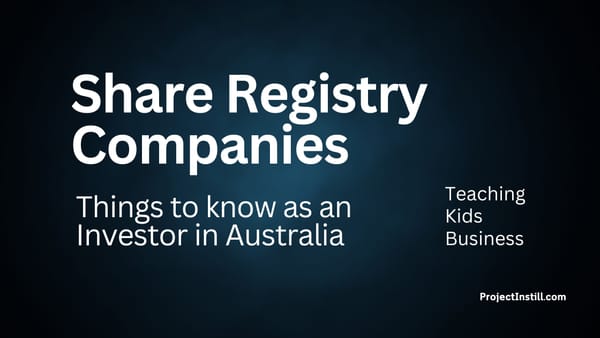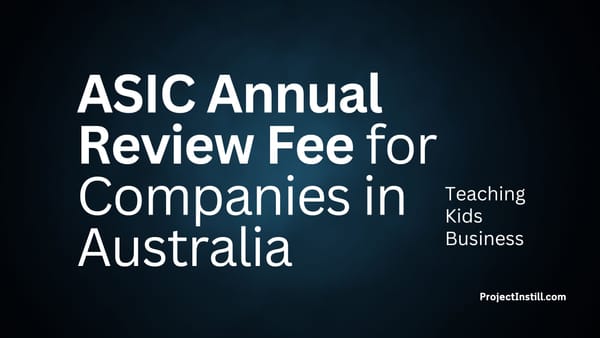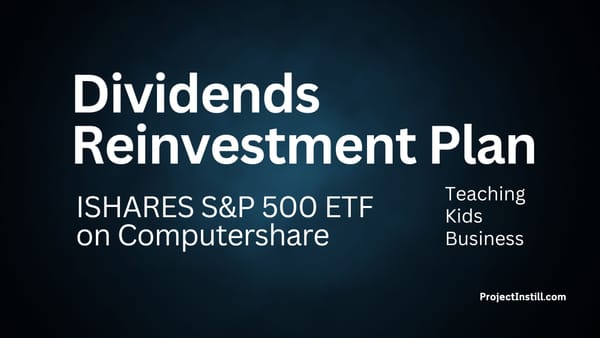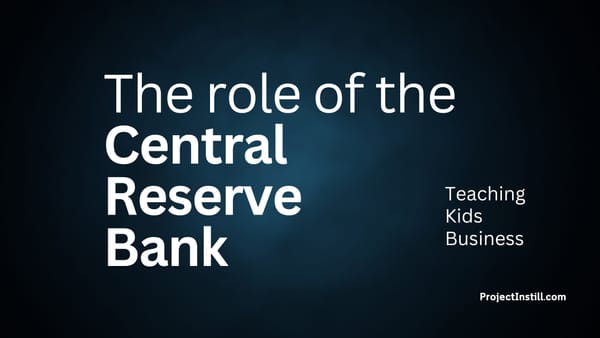Introduction to ETFs: What are ETFs and why invest in ETFs?
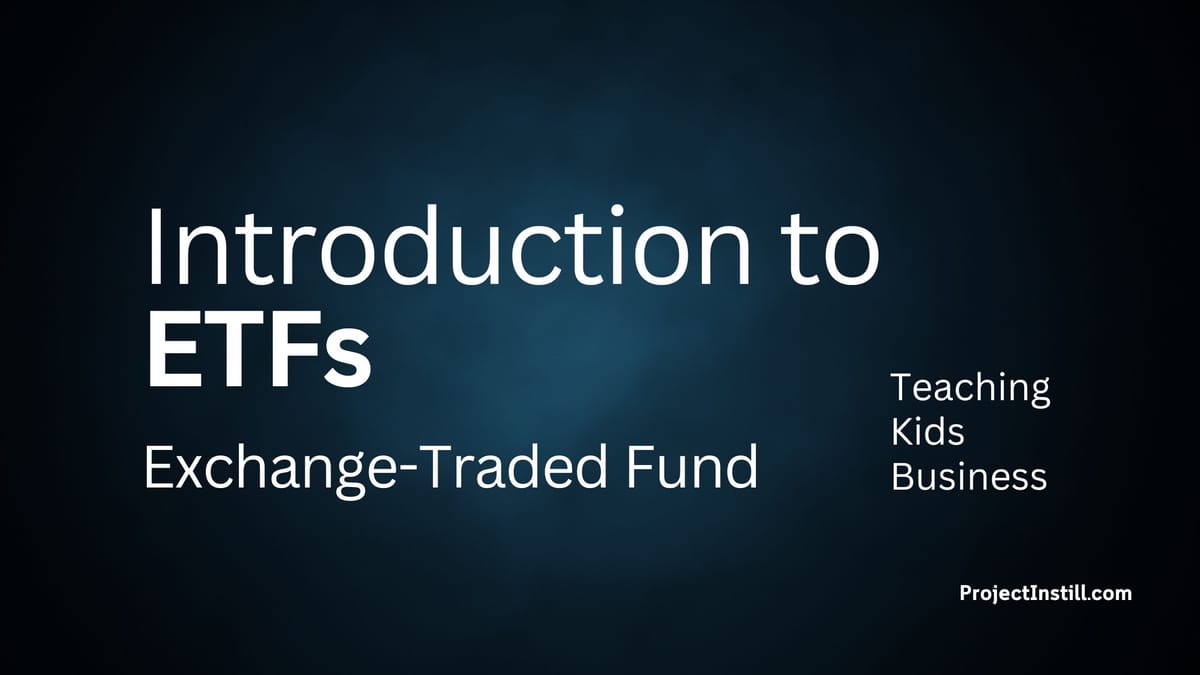
What did I want to do?
- I wanted my kids Ash (12 years old) and Adh (10 years old) to understand the concept of ETF (Exchange-Traded Fund).
- I wanted to take the opportunity to learn what ETFs are and if they are an instrument that we could consider investing in.
- We have already gone through what investing is and why we should invest.
Background
I was invested in one real estate property and was thinking of an actionable plan to build wealth.
-> I am not a Legal Expert.
-> I am not a Tax Expert.
-> I am not a Corporate Structure Expert.
-> I am not a Financial Planning Expert.
-> I am not an Investment Strategy Expert.
I am not an expert in anything!
Please research and engage relevant experts before you make any decisions.
The information I've shared is of a general nature and should not be considered as advice. It does not take into account your objectives, financial situation or needs. Before acting on any information, you should consider the appropriateness of the information provided regarding your objectives, financial situation and needs. In particular, you should seek independent professional advice and engage relevant experts before making decisions.
In early 2024, in one of our casual chats, a friend - Nizam Mohamed, Founder of Prolaborate, asked me if I had looked into ETFs. He was quite passionate about ETFs, but I did not pay much attention to it.
I did not know what ETFs were. I have heard about stocks/shares, but I have always stayed out of them simply because I knew a couple of friends who had lost a lot of money in shares. I always wanted to buy shares as long-term investments. Readings over the last couple of years made me realise that long-term investments by holding a portfolio of shares are a mechanism to grow wealth.
Note: I was (and still am) NOT interested in quick-day trading of shares/stocks.
My interest in investing long-term in shares and my discussion with Nizam triggered my curiosity, but I was just too lazy to explore ETFs further.
Then, in mid-2024, we met again. This time, Nizam briefed me a lot more on ETFs. He had a systematic approach to investing every month, with a % allocation portfolio.
Summary of the discussion below:
- Real estate
- Average growth: The average time a property value becomes double is 7-10 years. In a best-case scenario, the property value may triple in 7-10 years.
- Minimum Required Capital: To buy a property, we need to make a 20% deposit as a minimum for the bank to give us the remaining 80% loan.
- ETFs
- Average growth: The average return of the ETF S&P 500 over the last 20 years is about 11% annually. This means it would take approximately less than seven years to double. There are other ETFs which have higher returns but also may be riskier. The S&P 500 is considered one of the safest ETFs.
- Minimum Required Capital: To get started with ETFs, I can start even with $1... (there are fees like brokerage fees, which I will explain later... but you get the idea). Unlike real estate, where we must save a lot of money to pay the deposit.
- There is another crucial difference:
- If you have a property, you can borrow more money from the bank when its value goes up. This is not possible with ETFs.
- On another note, selling an ETF is easier and faster than selling a property.
This discussion convinced me to explore ETFs further.
Past performance may not be indicative of future results.
Different types of investments involve varying degree of risk, and there can be no assurance that the future performance of any specific investment or investment strategy, or product made reference to directly or indirectly in this article, will be profitable.
Links and references to investment approaches and products are provided for informational purposes only and in no way should be considered a recommendation of any particular investment product, vehicle, service or instrument or the rendering of investment advice, which must always be evaluated by a prospective investor in consultation with his or her own financial adviser and in light of his or her own circumstances, including the investor's investment horizon, appetite for risk, and ability to withstand a potential loss of some or all of an investment's value.
I wanted to understand:
- Should I invest in real estate?
- Should I invest in shares?
- Should I invest in ETFs?
Why can't we do all three to diversify (i.e. spread the risk?)
I knew something about real estate and shares. I did not even know what the word ETF meant. So, I started reading about ETFs.
What is an ETF?
Summary of my findings:
- ETF = Exchange-Traded Fund
- It is a type of investment fund. Usually, investment funds have a person or team called a Fund Manager who follows a specific strategy to invest in certain investments.
- It is Exchange-Traded - this means we can buy and sell ETFs in an Exchange just like an individual stock of a company that can be bought and sold in a Stock Market Exchange.
- There are multiple types of ETFs (e.g. some that invest only in Technology companies, some that invest only in Green Energy companies, some that invest only, some that invest only in high-performing companies, etc)
- We can buy a portion of ownership of the fund - ETF share.
- ETF share price can increase or decrease as people buy and sell ETF shares in the market.
- Buying 1 share of ETF is like buying a small portion of multiple stocks across multiple companies.
- Buying ETF shares means diversifying across stocks of multiple companies... instead of manually trying to find out which company stocks to buy, buying an ETF share spreads the risk across various companies.
ETF vs Stock of a Company?
Though I hadn't invested in a stock or ETF before, I now had to decide. What would I do if I had only $100 dollars and a choice between investing in an ETF or a company stock?
For me to make a decision, I had to find two things:
- If I were to invest in only one company stock, which would it be?
- If I were to invest in only one ETF, which would it be?
Trying to get an answer to Which company stock? - become a serious issue.
There were thousands and thousands of companies throughout the world. Where would I even start?
Could someone tell me which company stock to buy?
Searching on the internet - there were too many people giving too many recommendations.
My head started spinning.
I realised - that I do not have the capacity or patience (I am just lazy!) to evaluate companies and read their statements (balance sheets, income statements) to understand their potential growth, to make a decision on which company stock to invest in.
What if I could give the money to someone - and that person would constant look at different parameters to identify which company stocks to buy and sell. These were funds.
I was looking for a simpler alternative - and that was ETFs.
ETFs pool together a collection of companies based on specific rules.
So now, I wanted to identify which ETF to invest in.
My way of thinking was identifying the lowest-risk or safest ETFs, which was a relatively simple task.
- What I mean by lowest risk was that some ETFs delivered consistent long-term returns no matter what the economy, political climate, or the stock market does in the short run. Some ETFs hold up better during recessions and other periods of uncertainty.
S&P 500 ETF was one of the top contenders.
ETF vs real estate property?
I was, again, going back to the same question. If I had $100 dollars and had to choose between investing in an ETF vs real estate property?
$100 dollars is too low to consider for a real estate scenario. So, let's consider if I had $50,000. What would I choose? Real estate property or ETF?
What if I invested in real-estate?
- Paying $50,000 as a 20% deposit, I could borrow $200,000 (i.e. the remaining 80%) to buy a property worth $250,000.
- Since I recently invested in a property, I knew a couple more things were in play.
- Buying a property involves stamp duty charges - and that is an additional significant cost.
- Then, the landlord and building insurance are additional costs.
- Once we buy a property, we need to engage a property management company to advertise and get tenants - this is an additional cost.
- There is a risk of not being able to find tenants from day 1. Until we find a tenant, we have to pay the entire bank repayment from our funds. This is a significant risk.
- Even if we get a tenant, the rent we get from the tenant may not be sufficient enough to cover the bank repayments. Any shortfall would have to be born by us.
- Then there are expenses to manage the property - the electric switch needs to be replaced, the blinds need to be replaced, etc... things keep breaking, and we need to spend money to fix them.
- As we can see, the costs keep adding up.
What if I invested in ETFs?
- Paying $50,000, I would buy ETFs at market price.
- There would be a brokerage fee based on which brokerage platform I use.
- That's it... there are no additional costs.
Some key differences:
- I can start investing in ETFs with as low as $100 dollars.
- When the value of ETFs grows in future, I can not use the increased value of ETFs to borrow money from the bank. However, if the real-estate value goes up in the future, I can borrow more money from the bank based on the increased value. This is a significant difference.
- I can sell ETFs quickly if I want to. Selling a real estate property is a process that takes time and depends on getting the right buyer who is willing to pay the price we want.
Selling either an ETF, stock or real estate has tax implications - which we will discuss later.
Summary
After doing the research, my thought process was:
- Diversification is important to reduce risk. So, I need to find a way to invest and build wealth in the 3 types - real-estate property, stock and ETFs.
- They each serve a purpose and depend on the capacity you have. It also depends on the investor's maturity level and the strategy and intended outcome that the investor expects. This depends on the individual's circumstances.
Next Step
Let's try to purchase an ETF:
